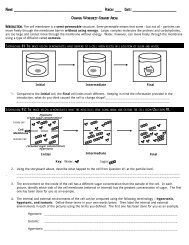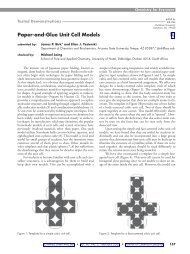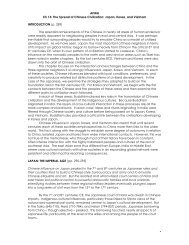Countee Cullen Poems - Cypress-Fairbanks High Schools and ...
Countee Cullen Poems - Cypress-Fairbanks High Schools and ...
Countee Cullen Poems - Cypress-Fairbanks High Schools and ...
You also want an ePaper? Increase the reach of your titles
YUMPU automatically turns print PDFs into web optimized ePapers that Google loves.
Deen VIolent enough to threaten senously hiS populanty. In the North the<br />
feeling has several times forced itself into words, that Mr. Washington's<br />
counsels of submission overlooked certain elements of true manhood, <strong>and</strong><br />
that his educational program was unnecessarily narrow. Usually, however,<br />
such criticism has not found open expression, although, too, the spiritual<br />
sons of the Abolitionists have not been prepared to acknowledge that the<br />
schools founded before Tuskegee, by men of broad ideals <strong>and</strong> self-sacrificing<br />
spirit, were wholly failures or worthy of ridicule. While, then, criticism has<br />
not failed to follow Mr. Washington, yet the prevailing public opinion of the<br />
l<strong>and</strong> has been but too willing to deliver the solution of a wearisome problem<br />
into his h<strong>and</strong>s, <strong>and</strong> say, "If that is all you <strong>and</strong> your race ask, take it."<br />
Among his own people, however, Mr. Washington has encountered the<br />
strongest <strong>and</strong> most lasting opposition, amounting at times to bitterness, <strong>and</strong><br />
even to-day continuing strong <strong>and</strong> insistent even though largely silenced in<br />
outward expression by the public opinion of the nation. Some of this opposition<br />
is, of course, mere envy; the disappointment of displaced demagogues<br />
<strong>and</strong> the spite of narrow minds. But aside from this, there is among educated<br />
<strong>and</strong> thoughtful colored men in all parts of the l<strong>and</strong> a feeling of deep regret,<br />
sorrow, <strong>and</strong> apprehension at the wide currency <strong>and</strong> ascendancy which some<br />
of Mr. Washington's theories have gained. These same men admire his sincerity<br />
of purpose, <strong>and</strong> are willing to forgive much to honest endeavor which<br />
is doing something worth the doing. They cooperate with Mr. Washington<br />
as far as they conscientiously can; <strong>and</strong>, indeed, it is no ordinary tribute to<br />
this man's tact <strong>and</strong> power that, steering as he must between so many<br />
diverse interests <strong>and</strong> opinions, he so largely retains the respect of all.<br />
But the hushing of the criticism of honest opponents is a dangerous thing.<br />
It leads some of the best of the critics to unfortunate silence <strong>and</strong> paralysis of<br />
effort, <strong>and</strong> others to burst into speech so passionately <strong>and</strong> intemperately as to<br />
lose listeners. Honest <strong>and</strong> earnest criticism from those whose interests are most<br />
nearly touched---eriticism of writers by readers, of government by those governed,<br />
of leaders by those led-this is the soul of democracy <strong>and</strong> the safeguard<br />
of modem society. If the best of the American Negroes receive by outer pfessure<br />
a leader whom they had not recognized before, manifestly there is here a<br />
certain palpable gain. Yet there is also irreparable 10ss-a loss of that peculiarly<br />
valuable education which a group receives when by search <strong>and</strong> criticism it<br />
finds <strong>and</strong> commissions its own leaders. The way in which this is done is at<br />
once the most elementary <strong>and</strong> the nicest problem of social growth. PIistory is<br />
but the record of such group-leadership; <strong>and</strong> yet how infinitely changeful is its<br />
type <strong>and</strong> character! And of all types <strong>and</strong> kinds, what can be more instructive<br />
than the leadership of a group within a group?-that curious double movement<br />
where real progress may be negative <strong>and</strong> actual advance be relative<br />
retrogression. All this is the social student's inspiration <strong>and</strong> despair.<br />
62 W. E. B. DuBois<br />
Now In the past the Amencan Negro has had Instructive expenence<br />
in the choosing of group leaders, founding thus a peculiar dynasty which in<br />
the light of present conditions is worth while studying. When sticks <strong>and</strong><br />
stones <strong>and</strong> beasts form the sole environment of a people, their attitude is<br />
largely one of determined opposition to <strong>and</strong> conquest of natural forces. But<br />
when to earth <strong>and</strong> brute is added an environment of men <strong>and</strong> ideas, then<br />
the attitude of the imprisoned group may take three main forms-a feeling<br />
of revolt <strong>and</strong> revenge; an attempt to adjust all thought <strong>and</strong> action to the<br />
will of the greater group; or, finally, a determined effort at self-realization<br />
<strong>and</strong> self-development despite environing opinion. The influence of all of<br />
these attitudes at various times can be traced to the history of the<br />
American Negro, <strong>and</strong> in the evolution of his successive leaders.<br />
Before 1750, while the fire of African freedom still burned in the veins<br />
of the slaves, there was in all leadership or attempted leadership but the<br />
one motive of revolt <strong>and</strong> revenge-typified in the terrible Maroons, the<br />
Danish blacks, <strong>and</strong> Cato of Stono, <strong>and</strong> veiling all the Americans in fear of<br />
insurrection. The liberalizing tendencies of the latter half of the eighteenth<br />
century brought, along with kindlier relations between black <strong>and</strong><br />
white, thoughts of ultimate adjustment <strong>and</strong> assimilation. Such aspiration<br />
was especially voiced in the earnest songs of Phyllis, in the martyrdom of<br />
Attucks, the fighting of Salem <strong>and</strong> Poor, the intellectual accomplishments<br />
of Banneker <strong>and</strong> Derham, <strong>and</strong> the political dem<strong>and</strong>s of the Cuffes.<br />
Stem financial <strong>and</strong> social stress after the war cooled much of the previous<br />
humanitarian ardor. The disappointment <strong>and</strong> impatience of Negroes<br />
at the persistence of slavery <strong>and</strong> serfdom voiced itself in two movements.<br />
The slaves in the South, aroused undoubtedly by vague rumors of the<br />
Haytian revolt, made three fierce attempts at insurrection-in 1800 under<br />
Gabriel in Virginia, in 1822 under Vesey in Carolina, <strong>and</strong> in 1831 again in<br />
Virginia under the terrible Nat Turner. In the Free States, on the other<br />
h<strong>and</strong>, a new <strong>and</strong> curious attempt at self-development was made. In<br />
Philadelphia <strong>and</strong> New York color-prescription led to a withdrawal of<br />
Negro communicants from white churches <strong>and</strong> the formation of a peculiar<br />
socio-religious institution among the Negroes known as the African<br />
Church-an organization still living <strong>and</strong> controlling in its various<br />
branches over a million of men.<br />
Walker's wild appeal against the trend of the times showed how the<br />
world was changing after the coming of the cotton-gin. By 1830 slavery<br />
seemed hopelessly fastened on the south <strong>and</strong> the slaves thoroughly cowed<br />
into submission. The free Negroes of the North, inspired by the mulatto<br />
immigrants from the West Indies, began to change the basis of their<br />
dem<strong>and</strong>s; they recognized the slavery of slaves, but insisted that they<br />
themselves were freemen, <strong>and</strong> sought assimilation <strong>and</strong> amalgamation with<br />
Of Mr. Booker T. Washington <strong>and</strong> Others 63
Of Mr. Booker T. Washington <strong>and</strong> Others<br />
Mr. Booker T. Washington. We have no right to sit silently by while the<br />
inevitable seeds are sown for a harvest of disaster to our children, black<br />
<strong>and</strong> white.<br />
First, it is the duty of black men to judge the South discriminatingly.<br />
The present generation of Southerners are not responsible for the past, <strong>and</strong><br />
they should not be blindly hated or blamed for it. Furthermore, to no class<br />
is the indiscriminate endorsement of the recent course of the South<br />
toward Negroes more nauseating than to the best thought of the South.<br />
The South is not "solid"; it is a l<strong>and</strong> in the ferment of social change,<br />
wherein forces of all kinds are fighting for supremacy; <strong>and</strong> to praise the ill<br />
the South is today perpetrating is just as wrong as to condemn the good.<br />
Discriminating <strong>and</strong> broad-minded criticism is what the South needsneeds<br />
it for the sake of her own white sons <strong>and</strong> daughters, <strong>and</strong> for the<br />
insurance of robust, healthy mental <strong>and</strong> moral development.<br />
To-day even the attitude of the Southern whites toward the blacks is<br />
not, as so many assume, in all cases the same; the ignorant Southerner<br />
hates the Negro, the workingmen fear his competition, the money-makers<br />
wish to use him as a laborer, some of the educated see a menace in his<br />
upward development, while others-usually the sons of the masters-wish<br />
to help him to rise. National opinion has enabled this last class to maintain<br />
the Negro common schools, <strong>and</strong> to protect the Negro partially in<br />
property, life, <strong>and</strong> limb. Through the pressure of money-makers, the Negro<br />
is in danger of being reduced to semi-slavery, especially in the country districts;<br />
the workingmen, '<strong>and</strong> those of the educated who fear the Negro,<br />
have united to disfranchise him, <strong>and</strong> some have urged his deportation;<br />
while the passions of the ignorant are easily aroused to lynch <strong>and</strong> abuse any<br />
black man. To praise this intricate whirl of thought <strong>and</strong> prejudice is nonsense;<br />
to inveigh indiscriminately against "the South" is unjust; but to use<br />
the same breath in praising Governor Aycock, exposing Senator Morgan,<br />
arguing with Mr. Thomas Nelson Page, <strong>and</strong> denouncing Senator Ben<br />
Tillman, is not only sane, but the imperative duty of thinking black men.<br />
It would be unjust to Mr. Washington not to acknowledge that in several<br />
instances he has opposed movements in the South which were unjust<br />
to the Negro; he sent memorials to the Louisiana <strong>and</strong> Alabama constitutional<br />
conventions, he has spoken against lynching, <strong>and</strong> in other ways has<br />
openly or silently set his influence against sinister schemes <strong>and</strong> unfortunate<br />
happenings. Notwithst<strong>and</strong>ing this, it is equally true to assert that on<br />
the whole the distinct impression left by Mr. Washington's propag<strong>and</strong>a is<br />
first, that the South is justified in its present attitude toward the Negro<br />
because of the Negro's degradation; secondly, that the prime cause of the<br />
Negro's failure to rise more quickly is his wrong education in the past; <strong>and</strong>,<br />
thirdly, that his future rise depends primarily on his own efforts. Each of<br />
Of Mr. Booker T. Washington <strong>and</strong> Others<br />
these propositions is a dangerous half-truth. The supplementary truths<br />
must never be lost sight of: first, slavery <strong>and</strong> race-prejudice are potent if<br />
not sufficient causes of the Negro's position, second, industrial <strong>and</strong><br />
common-school training were necessarily slow in planting because they<br />
had to await the black teachers trained by higher institutions-it being<br />
extremely doubtful if any essentially different development was possible,<br />
<strong>and</strong> certainly a Tuskegee was unthinkable before 1880; <strong>and</strong> third, while it<br />
is a great truth to say that the Negro must strive <strong>and</strong> strive mightily to help<br />
himself it is equally true that unless his striving be not simply seconded, but<br />
rather aroused <strong>and</strong> encouraged, by the initiative of the richer <strong>and</strong> wiser<br />
environing group, he cannot hope for great success.<br />
In his failure to realize <strong>and</strong> impress this last point, Mr. Washington is<br />
especiaily to be criticized. His doctrine has tended to make the whites,<br />
North <strong>and</strong> South, shift the burden of the Negro problem to the Negro's<br />
shoulders <strong>and</strong> st<strong>and</strong> aside as critical <strong>and</strong> rather pessimistic spectators; when<br />
in fact the burden belongs to the nation, <strong>and</strong> the h<strong>and</strong>s of none of us are<br />
clean if we bend not our energies to righting these great wrongs.<br />
The South ought to be led, by c<strong>and</strong>id <strong>and</strong> honest criticism, to assert her<br />
better self <strong>and</strong> do her full duty to the race she has cruelly wronged <strong>and</strong> is still<br />
wronging. The North-her co-partner in guilt---eannot salve her conscience<br />
by plastering it with gold. We cannot settle this problem by diplomacy <strong>and</strong><br />
suaveness, by "policy" alone. If worse comes to worst, can the moral fiber of<br />
this country survive the slow throttling <strong>and</strong> murder of nine millions of men?<br />
The black men of America have a duty to perform, a duty stern <strong>and</strong> delicate-a<br />
forward movement to oppose a part of the work of their greatest<br />
leader. So far as Mr. Washington preaches Thrift, Patience, <strong>and</strong> Industrial<br />
Training for the masses, we must hold up his h<strong>and</strong>s <strong>and</strong> strive with him,<br />
rejoicing in his honors <strong>and</strong> glorying in the strength of this Joshua called of<br />
God <strong>and</strong> of man to lead the headless host. But so far as Mr. Washington<br />
apologizes for injustice, North or South, does not rightly value the privilege<br />
<strong>and</strong> duty of voting, belittles the emasculating effects of caste distinctions,<br />
<strong>and</strong> opposes the higher training <strong>and</strong> ambition of our brighter minds-so far<br />
as he, the South, or the Nation, does this-we must unceasingly <strong>and</strong> firmly<br />
oppose them. By every civilized <strong>and</strong> peaceful method we must strive for the<br />
rights which the world accords to men, clinging unwaveringly to those great<br />
words which the sons of the Fathers would fain forget: "We hold these truths<br />
to be self-evident: That all men are created equal; that they are endowed by<br />
their Creator with certain unalienable rights; that among these are life, liberty,<br />
<strong>and</strong> the pursuit of happiness."<br />
•••<br />
•
]20 HARLEM SPEAKS<br />
that "Varna had based it on countless stories Josephine had told him<br />
about America, which he had never visited <strong>and</strong> with which he was<br />
fascinated." It was a reminder to the audience of her status as a star<br />
expatriate in Paris <strong>and</strong> her love of her adopted city.<br />
Baker made two major films in the 1930s. One was Zou,Zou<br />
(1934), a light romantic comedy with Jean Gabin. Directed by Marc<br />
Allegret <strong>and</strong> with music by Spencer Williams, this film used a great<br />
deal of autobiographical material from Baker's own life. The young<br />
heroine in the film, just like Josephine Baker, yearns for a successful<br />
career on the stage. She becomes a star but is lonely because she has<br />
no one with whom to share her life. The other film was Princess<br />
Tam,Tam (1935), produced by Arya Nissotti, a Tunisian casino<br />
owner. Shot in Tunisia, it was the tale of an Arab urchin who<br />
became a social butterfly in the h<strong>and</strong>s of a French nobleman. Of<br />
these two films, Zou,Zou appealed to Baker <strong>and</strong> to audiences much<br />
more than did Princess Tam'Tam. Baker also played the starring role<br />
in Offenbach's operetta La Creole in 1934.<br />
By the mid-1930s, Josephine had conquered Paris as dancer,<br />
singer, <strong>and</strong> actress. It was time for her, after fourteen years, to return<br />
to the United States <strong>and</strong> to bewitch Broadway audiences just as she<br />
had done in Paris. In 1936, she went to New York to perform in the<br />
Ziegfeld Follies, the American counterpart of the revues in Paris. In<br />
the Winter Garden Theater, Josephine's voice could hardly be<br />
heard. The reviews she received were devastating. In fact, of the<br />
entire cast, she alone received totally negative comments. The New<br />
York Times wrote that "Miss Baker refined her art until there is<br />
nothing left of it." Baker needed a scapegoat for her failure <strong>and</strong> that<br />
was Pepito, who could not endure Josephine's attacks <strong>and</strong> left her<br />
alone in New York. He died in Paris a few months later. It would be<br />
very hard for Baker to find another man who loved, supported, <strong>and</strong><br />
cared for her as much as Pepito had.<br />
Upon the invitation of her old boss from the Folies,Bergere, Paul<br />
Derval, Baker returned to Paris to star in the Folies-Bergere revue in<br />
1937 at the age of thirty,one. She also opened a new Chez<br />
Josephine, which attracted tourists who came to Paris for the Colo-<br />
JOSEPHINE BAKER ]2I<br />
nial Exposition. In the meantime, she fell in love with a multimillionaire<br />
sugar broker, Jean Lion, <strong>and</strong> married him. The couple sepa,<br />
rated within a year.<br />
In 1939, Hitler attacked Pol<strong>and</strong> <strong>and</strong> plunged Europe into war.<br />
With the war, a new phase started in Baker's life. Her humanitarian,<br />
ism replaced her self,indulgent behavior. When Germany occupied<br />
Belgium, she became a Red Cross nurse, watching over refugees.<br />
When Germany occupied France, she worked for the French resist,<br />
ance as an underground courier. She performed with Maurice<br />
"Black is Beautiful" postcard: "Overhearing the Kennecott sisters say that they<br />
liked men who were tall, dark, <strong>and</strong> h<strong>and</strong>some, the guys figured to at least hit one<br />
out of three."<br />
Halloween costumes <strong>and</strong> black&ce, 1949: Nidus Derm<strong>and</strong> as AlJolson (11Iejazz<br />
Singer) <strong>and</strong> Kathy' Derm<strong>and</strong> as Aunt Jemima. Reproduced counesy of Kathy<br />
Starbuck.<br />
Algona, Iowa, in 1949, the photographs demonstrate continued racial<br />
insensitivity. Clearly, children became part of the white adults'<br />
world of black misrepresentation <strong>and</strong> racial tension. Such deceptively<br />
innocent black costumes signaled the larger task of black artists<br />
to present blacks without stereotype <strong>and</strong> caricature.<br />
NOTES<br />
1. Cited in "Archie Bunker, Alive <strong>and</strong> Well: Stereotypes Die Hard,"<br />
Newsweek (21 January 1991): 59.<br />
2. Marlon Riggs, Ethnic Notions: Black Images in White Minds (San<br />
Francisco: California Newsreel, 1987), Transcript #1.<br />
3. Sterling B. Brown, "Negro Character as Seen by White Authors,"<br />
Journal ofNegro Education 2 (April 1933): 201.<br />
4. Henry Louis Gates Jr., "1V's Black World Turns-But Stays Unreal,"<br />
in Diana George <strong>and</strong> John Trimbur, eds., Reading Culture: Contexts for<br />
Critical Reading <strong>and</strong> Writing (New York: HarperCollins, 1992),468.<br />
5. Alain Locke, "The New Negro," in The New Negro: Voices of the<br />
Harlem Renaissance (New York: Atheneum, 1992),3-4.<br />
6. Richard Wright, "Between Laughter <strong>and</strong> Tears," New Masses (5 October<br />
1937): n.p.<br />
7. Alain Locke, review of Zora Neale Hurston's Their Eyes Were Watching<br />
God, in Opportunity (1 June 1938). Quoted in Henry Louis Gates Jr.<br />
<strong>and</strong> A. K. Appiah, eds., Zora Neale Hurston: Critical Perspectives Past<br />
<strong>and</strong> Present (New York: Amistad, 1993), 18. See other reviews by Lucille<br />
Tompkins (New York Times Book Review, 26 September 1937), Sterling<br />
Brown (The Nation, 16 October 1937), Sheila Hibben (New York Herald<br />
Tribune Weekry Book Review, 26 September 1937), <strong>and</strong> Otis Ferguson<br />
(New Republic, 3 October 1937) in Gates <strong>and</strong> Appiah, Zora Neale Hurston,<br />
pp. 18-23.<br />
STUDY QUESTIONS<br />
1. What was the Harlem Renaissance, what were its philosophical Ideals,<br />
<strong>and</strong> who were its primary writers?<br />
2. Research the roles of music, art, <strong>and</strong> theater dUring the Harlem Renaissance.<br />
3. To what extent does racial privilege allow Hurston to present blacks<br />
in ways that white authors could not without causing serious social<br />
<strong>and</strong> political repercussions?<br />
4. Discuss the validity of the arguments presented in Richard Wright's<br />
critique of lora Neale Hurston's Their Eyes Were Watching God.
4 Underst<strong>and</strong>ing Their Eyes Were Watching God<br />
Literary Analysis<br />
5<br />
thought, reconceptualization ofan African past, <strong>and</strong> communal cel·<br />
ebration, he nevertheless attacked Hurston's novel as "oversimplification,"<br />
full of "these pseudo-primitives whom the [white]<br />
reading public still loves to laugh with, weep over <strong>and</strong> envy."7 It<br />
is precisely this redefinition of African American social protest <strong>and</strong><br />
African American identity that Hurston presents in Their Eyes Were<br />
WatchIng God. Through an exploration of Ufe <strong>and</strong> death, romance,<br />
family relations, violence, <strong>and</strong> laughter, Hurston raises the folklore<br />
<strong>and</strong> folk art of African Americans to high culture.<br />
Published in 1937, Zora Neale Hurston's TheIr Eyes Were Watch<br />
Ing God is a heterosexual love story textured by a general feminist<br />
consciousness <strong>and</strong> a distinctly African American consciousness. It<br />
is the story of janie, who longs to exen herself as a free, thinking<br />
woman in a society of men <strong>and</strong> women bent on defining her realities<br />
in theIr selfish terms. janie's is not a quest for self-identity<br />
but rather a journey toward freedom to be herself <strong>and</strong> to accept<br />
responsibility for the choices she makes in search of physical <strong>and</strong><br />
spiritual self-satisfaction. As janie tells her story, Hurston celebrates<br />
the life of a black woman who is able to accept what she cannot<br />
control or underst<strong>and</strong>. While janie is exalted in Hurston's eyes for<br />
her experiential wisdom, janie herself is humbled by her life experiences,<br />
especially the death ofTea Cake, her third <strong>and</strong> youngest<br />
husb<strong>and</strong>, ultimately at her own h<strong>and</strong>.<br />
janie first endeavors to appease her gr<strong>and</strong>mother, whose ideas<br />
about black women leave janie no room for independent thought<br />
or action. Nanny can only see janie's emotional <strong>and</strong> psychological<br />
maturity through her own experiences as a former slave controlled<br />
by white men. According to Nanny, a black woman ought to want<br />
a man with property <strong>and</strong> the ability to provide for her-hence<br />
Nanny's arrangement of janie's marriage to an older man, Logan<br />
KiIIicks. Bent on making janie a fieldh<strong>and</strong> or work animal, when<br />
janie does not obey his dem<strong>and</strong>s <strong>and</strong> comm<strong>and</strong>s Logan presents<br />
himself in behavior <strong>and</strong> word like a slave master with insults <strong>and</strong> .<br />
threats of violence.<br />
janie's relationship with jody Starks is initially one of intense<br />
romance, full of rhyme <strong>and</strong> rhythm. jody, seemingly very different<br />
from janie's first husb<strong>and</strong>, Logan, is a businessman intent on creating<br />
a community of black folk under his official guidance <strong>and</strong><br />
charge. A man with money, power, <strong>and</strong> organizational skills, jody<br />
seeks to place janie atop a pedestal as the mayor's wife without<br />
any concern for her wants or needs. For jody, janie's role is to<br />
move according to his direction <strong>and</strong> to speak according to his<br />
script, one that centers him <strong>and</strong> seeks to publicly silence janie.<br />
While janie's resistance to Logan is vocal <strong>and</strong> ultimately results in<br />
her decision to ab<strong>and</strong>on hlm, her resistance to jody's dominance<br />
<strong>and</strong> rules is internal <strong>and</strong> thoughtful. Tbat ultimate defiance comes<br />
when she challenges <strong>and</strong> insults his manhood before an audience<br />
of his male peers. His death after twenty years of marriage to janie<br />
almost immediately follows his public embarrassment.<br />
In the beginning of janie's third romance, Tea Cake-fifteen<br />
years younger than janie-seems her ideal companion. He allows<br />
her freedom to experience life as she sees fit without feeling intimidated.<br />
As janie <strong>and</strong> Tea Cake live as partners <strong>and</strong> soulmates participating<br />
in life harmoniously, their relationship is the envy <strong>and</strong><br />
curiosity of gossipers <strong>and</strong> onlookers. They fish, go to baseball<br />
games, play checkers, cook meals together. He even teaches her<br />
how to shoot a gun. The nosy intraracist, Mrs. Turner, tries to pull<br />
janie away from the "too dark" Tea Cake to consider a romance<br />
with her brother. janie resists the temptation as Tea Cake is all she<br />
has ever wanted. In fact, her intense passion for Tea Cake leads<br />
her to battle Nunkie, who is allegedly trying to romance Tea Cake.<br />
janie's life with Tea Cake becomes an emotional rollercoaster. He<br />
takes her money <strong>and</strong> stays out all night, then comes home with<br />
few or no explanations for his actions. He even hits janie to signal<br />
for curious onlookers <strong>and</strong> for himself his own constructed masculinity.<br />
Yet the depth of janie's love for Tea Cake sustains her<br />
through these moments of emotional duress, for Tea Cake has<br />
made her feel the vulnerabilities of love <strong>and</strong> passion, something<br />
she never experienced meaningfully with her two previous husb<strong>and</strong>s.<br />
Tea Cake's sickness <strong>and</strong> subsequent death remind janie of<br />
the precious nature of life <strong>and</strong> of the dignity necessary to accept<br />
what cannot be explained or controlled. As janie reflects on her<br />
experiences in her testimony to her best friend, Phoeby, she does<br />
so without regret of love lost but with integrity <strong>and</strong> strength from<br />
love experienced.<br />
Dealing with romance, community rituals, race relatiOns,<br />
women's identity, women's sexuality, <strong>and</strong> individual <strong>and</strong> communal<br />
performance rituals, TheIr Eyes Were WatchIng God celebrates<br />
the complexities of African American people generally <strong>and</strong> of Af

















